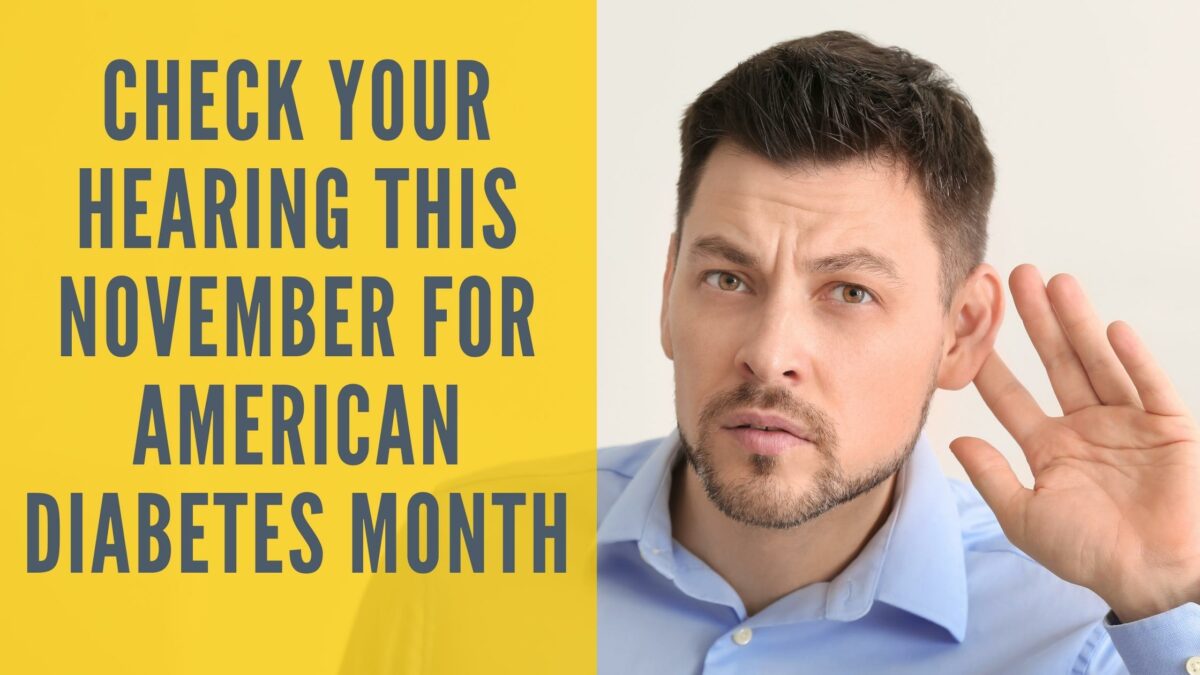As you put together your upcoming holiday season to-do lists, schedule a hearing test to the top! We’re advocating for folks to prioritize hearing health this November because it happens to line up with the American Diabetes Association’s American Diabetes Month. And, while the tireless work of diabetes educators continues year-round, we want to draw special attention to the little-known impact of diabetes on your hearing health.
In recent studies, people with diabetes have shown to be two times as likely to exhibit hearing loss than in people without the disease, even after adjusting for age. What’s more, people who even display signs of prediabetes tend to have a 30 percent higher rate of hearing loss compared to people with normal blood sugar levels.
Leading chronic health conditions
Diabetes is a leading chronic health condition for the American public. According to the Centers for Disease Control and Prevention (CDC), more than one in ten Americans has diabetes. These rates are close to the numbers surrounding hearing loss. In the United States, one in eight people over 12 years of age has hearing loss in both ears. While both are worthy of preventative education, research points to the fact that there is already a large degree of overlap in people with both challenged hearing and diabetes.
What is diabetes?
Diabetes is fundamentally an issue with our body’s ability to turn food into energy. When we eat, our body begins to turn that sustenance into fuel by turning it into glucose (sugar). In people without diabetes, the body notices an increased blood sugar level and releases insulin. Naturally produced by the body, this insulin is key in the delivery of glucose into our cell’s energy.
However, in people with Type I diabetes, the body does not produce enough insulin. This can be treated with medication and insulin must be administered. For people with Type II diabetes, their body has become insulin resistant, which means that the insulin they produce is not able to be efficiently used by the body to get energy from glucose. This type of diabetes is usually treated using a combination of medication and cultivating lifestyle changes like increased activity and a diet high in leafy greens and limited in starchy or high-carbohydrate foods.
How might diabetes damage hearing?
Diabetes carries a host of other health implications with it. Because blood sugar levels in people with diabetes often spike and dip wildly, it creates a toxic environment for cells. It is presumed that this toxicity is to blame for resulting in hearing loss.
The cells of our inner ear are integral in the hearing process. They receive the sound information from the external world and translate it to the brain via the auditory nerve. The cells of the inner ear are also sensitive and non-regenerative. That means that once they are damaged, they don’t repair themselves nor do they reproduce more. We are born with a finite number and when they decline, we simply hear less.
Early symptoms of hearing loss
Hearing loss is notoriously difficult to self-diagnose, and it’s more than likely that your friends and family notice your hearing loss before you will. We are, as humans, adaptable creatures and we can quickly find ways to accommodate impediments in all of our movements and senses. You might even be doing this on a subconscious level!
Early signs of hearing loss are often subtle because we tend to lose high-frequency sounds first, rather than an overall lowering of volume. It might seem as though everyone around you is mumbling their words, you have to ask ‘what?’ many times in conversation or you have particular trouble conversing in a group setting.
Interventions in hearing loss
Like diabetes, hearing loss is not curable, though it is easily treatable. We have proven, successful solutions for hearing loss like cochlear implants or hearing aids. People who opt for hearing aids often report improved relationships and the vast majority would recommend hearing aids to a friend. Schedule that hearing test today so that our team of hearing health professionals can lead you through the easy process of a hearing exam and then guide you through your results and any recommended treatment plans that could enhance your listening experience.

